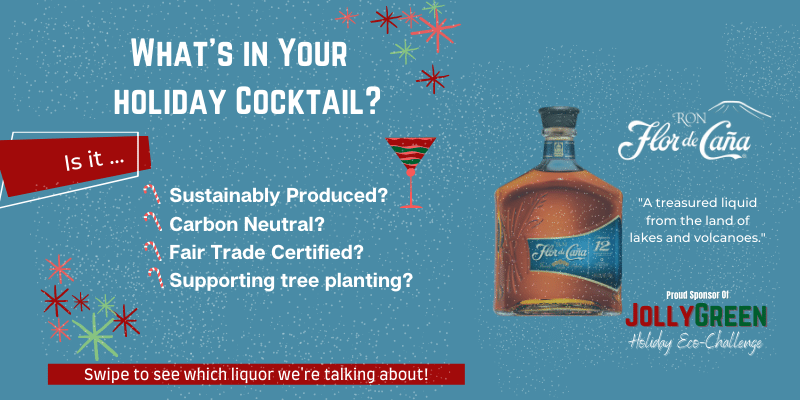This advertisement was created by Ron Flor De Caña, a Nicaraguan company to promote its sustainably produced rum for the ‘What’s In Your Holiday Cocktail’ campaign. The advertisement takes the form of a still image. It shows a blend of festive, bright colors with its holiday-themed design, reflecting some values of the brand including being sustainably produced, carbon neutral, fair trade certified, and supporting tree planting.
The composition of the advertisement follows a top-to-bottom layout, where the text is placed in the left half, and the product (the rum bottle) is positioned on the right side of the image. The holiday theme is most prominent, with the bright red and green colors. The background is a solid blue with overlays of elements like candy canes, twinkling stars, and snow-like white dots around the image, each representing an element of the Christmas season.
In the foreground, is a bottle of the rum itself, the Ron Flor De Caña rum. The bottle’s label is blue, and the content of the bottle is brown enhancing the feeling of warmth and authenticity. The brown color also acts as a strong contrast to the blue background itself, enhancing the visual appeal of the rum.
The text at the top reads, “What’s In Your Holiday Cocktail?” capturing viewers’ attention. This headline also confirms the holiday-themed design represented in the advertisement. It is then followed by a series of questions, “Sustainably Produced”, “Carbon Neutral”, “Fair Trade Certified”, and “Supporting Tree Planting?”, which are all rhetorical to make viewers question their drinking choices, suggesting that Ron Flor De Caña meets all these requirements.
The advertisement also features at the bottom right of the image, the text “Proud Sponsor of the Jolly Green Eco Challenge” reinforcing that the company seems to be eco-friendly in its practices. “A Treasured Liquid from the Land of Lakes and Volcanoes” gives an insight to the rich quality of the rum and also on the Nicaraguan roots. The overall quality of the image is sharp and clear allowing the message of the product to be communicated effectively.
The message conveyed by the advertisement is primarily to challenge viewers to make environmentally conscious drinking choices. The advertisement passes on the message that the Ron Flor De Caña Rum is a sustainable option to drink whilst still actively promoting eco-friendly practices. By emphasizing the rum has sustainable practices, is carbon neutral, fair trade certified and that the company promotes tree planting activities, it appeals to environmentally conscious viewers who seek to promote sustainable and eco-friendly practices.
The message of the advertisement is also conveyed in its visual appeal to viewers. Through the implementation of certain visual elements like the bright and festive colors, the holiday ornaments in design like the candy canes, the twinkling stars, and the champagne glass, it affirms the holiday-themed campaign, informing the viewers that they can enjoy the holidays whilst still maintaining environmentally friendly practices.
Also, the use of the phrase “Treasured Liquid” to give a description of the rum plays the role of providing viewers with a sense of quality and exclusivity in the taste of the rum. It elicits the viewers’ senses appealing to their taste buds showing that despite the environmentally friendly practices involved in production, the rum has a rich, delightful taste. It shows that it is not only delicious but eco-friendly.
The use of the holiday visuals and the phrase “Proud Sponsor of the Jolly Green Holiday Eco Challenge”, gives the impression to viewers that they are a part of the initiative and that they can enjoy their holiday whilst still promoting these friendly practices.
The image is quite effective in reaching its target audience. The appropriate target audience for the advertisement would be those who are of age to drink likely over 21 in most regions, who are also environmentally conscious individuals seeking means to practice eco-friendly activities in a bid to help the environment. Through both the convincing message passed which claims that the rum is a sustainable option listing its several practices, and the visual appeal of the advertisement, through the aesthetics, the holiday-themed design, and vibrant representation of the rum, it effectively conveys its message to the target audience.
Personally, the advert quite resonates with me. I don’t indulge in drinking, but if I did, going for this rum would be my best option as it gives me a sense of contribution. A sense that I’m not only consuming quality rum but also maintaining eco-friendly practices to positively impact the environment, which shows that the advert quite resonates with the target audience.
This advert, however, raises several questions. How does one monitor the progress of the company towards its environmentally friendly claims? What is the track record of this company towards its impact on the environment? and why doesn’t this advert seek to promote drinking responsibly as every alcohol brand should? This leaves room for concern about the brand’s approach even though positioned as eco-friendly.
Ron Flor de Caña is a Nicaraguan rum brand established in 1890, and while it may not be widely recognized, it has a reputation in the spirits industry, for its premium rum. I became aware of this company through its advertisements promoting sustainable production, which aligns with consumer demand for eco-friendly products.
The practices of companies like Ron Flor De Caña, along with others in the alcohol industry, regarding sustainable manufacturing and environmental policies, have been critically evaluated by several sources. Zakkiyah Walker, the CEO of Chalice Premium—a brand focused on providing nutritious choices to consumers—commends the recent efforts toward sustainability in alcohol production. She emphasizes that traditional methods often have negative impacts on the environment. As she explains, “Traditional alcohol production processes are resource-intensive — involving water, energy, and raw materials, all of which can take a toll on the environment” (Chalice Premium Club, 2024). Walker further notes that “the alcohol industry is experiencing a much-needed push towards sustainability. It’s an exciting and transformative time for the adult beverages sector” (Chalice Premium Club, 2024).
These concerns about the environmental pollution of alcohol production are expressed by the Institute of Alcohol Studies (IAS), which calls on companies to adopt more sustainable practices. The IAS report explains, “The production, packaging, transporting, and storing of alcoholic products contribute a significant amount to greenhouse gas emissions around the world, as well as various other environmental harms. Companies and individuals should change their practices in order to reduce this impact” (Institute of Alcohol Studies, 2022). Given the serious environmental impact of alcohol production, Ron Flor De Caña seems to be taking notable steps toward mitigating these effects through its sustainability efforts.
In addition, a journal article from Health Promotional International offers further insight into the environmental dangers linked to alcohol production. “Alcohol production is an energy-intensive process, from farming through to bottling, requiring significant quantities of water—taking around 800 liters of water to produce just 1 liter of wine” (Cook et al., 2024). The article highlights that “while many countries face extreme droughts, clean drinking water is being used to produce a consumer commodity with vast social, economic, and health costs” (Cook et al., 2024). Although research on greenwashing practices within the alcohol industry is limited, Cook et al. (2024) urge that many companies emphasize corporate social responsibility initiatives that promote sustainability, particularly through their environmental actions.
The report concludes with a call to action, urging both governments and companies to take greater responsibility: “Global corporations should work to reduce emissions and other causes of environmental harm resulting from the production and dissemination of their products, and governments must ensure they do this” (Cook et al., 2024). As the alcohol industry continues to expand economically, it becomes important to hold companies accountable for their environmental claims and ensure they back them with actions.
There is an increase in mindful purchasing, not only in the beverage industry, as this extends to alcohol consumption as well. “Research by Kerry Group in July 2021 highlights that 49 percent of consumers now consider sustainability credentials when buying food and drinks, a finding based on a survey of 14,000 consumers across 18 countries (Kerry Group, 2021). This shift in consumer behavior is also reflected within the beverage alcohol space. For instance, research by the IWSR reveals that 48 percent of U.S. alcohol drinkers say a company’s sustainability or environmental initiatives positively influence their purchasing decisions” (Stephens, 2022)
Given this trend, it’s clear that Ron Flor De Caña’s emphasis on sustainability—through its carbon-neutral practices, support for tree planting, and fair-trade certifications—aligns with the preferences of these consumers. In the case of Ron Flor de Caña, there is no evidence of major consumer critiques, or boycotts forcing the company to change its environmental practices. Given the expectations for sustainable business practices, Ron Flor de Caña’s practices help it remain relevant in the industry.
Bibliography
Chalice Premium Club, “The Rise of Sustainable Adult Beverages: How Sustainability Transformed the Alcohol Industry,” Medium, January 9, 2024, (https://medium.com/@chalice.club/the-rise-of-sustainable-adult-beverages-how-sustainability-transformed-the-alcohol-industry-84f6dc194c5d.)
Cook, Megan, Nathan Critchlow, Rachel O’Donnell, and Sarah MacLean. 2024.
“Alcohol’s Contribution to Climate Change and Other Environmental Degradation: A Call for
Research.” Health Promotion International 39 (1). (https://doi.org/10.1093/heapro/daae004) .
Roberts, Jem, Sarah Schoenberger, Jennifer Keen, and Institute of Alcohol Studies. People, Planet, or Profit: Alcohol’s Impact on a Sustainable Future. Institute of Alcohol Studies, 2022. https://www.ias.org.uk/wp-content/uploads/2022/11/People-Planet-or-Profit-alcohols-impact-on-a-sustainable-future-IAS.pdf.
(https://www.ias.org.uk/wp-content/uploads/2022/11/People-Planet-or-Profit-alcohols-impact-on-a-sustainable-future-IAS.pdf.)
Stephens, Hollie. 2022. “Do Spirits Need to Be Sustainable to Sell? | SevenFifty Daily.” SevenFifty Daily. January 31, 2022. (https://daily.sevenfifty.com/do-spirits-need-to-be-sustainable-to-sell/.)


Adesire
Hi Oreoluwa,
I found your analysis very insightful and well-written. I particularly appreciated your in-depth analysis of the image, especially your interpretation of the phrase “Treasured Taste.” You effectively conveyed how it reassures consumers that they don’t have to compromise on the quality of the rum in favour of eco-friendliness.
However, I believe your analysis could have been stronger with a more visually rich image to dissect. While the chosen advertisement has visual elements, it is very text-heavy, and the visuals do little to convey a sense of “eco-consciousness” or “sustainability”. As you noted, it primarily conveys a festive holiday theme. Also, your analysis focused very little on the environmental messaging of the visuals, which may be because the visuals themselves do not project any. A stronger image choice could have better supported your insights and opinions.
Your breakdown of the environmental impacts of traditional alcohol-making was particularly well done. The research and citations you included added both legitimacy and depth to your analysis. The breakdown of the alcohol industry and consumerism offers valuable context and colour, allowing readers to observe the chosen advertisement with a new perspective.
All in all, while your analytic and research skills made for a compelling piece, the image chosen slightly limits your exploration of the themes of this analysis.